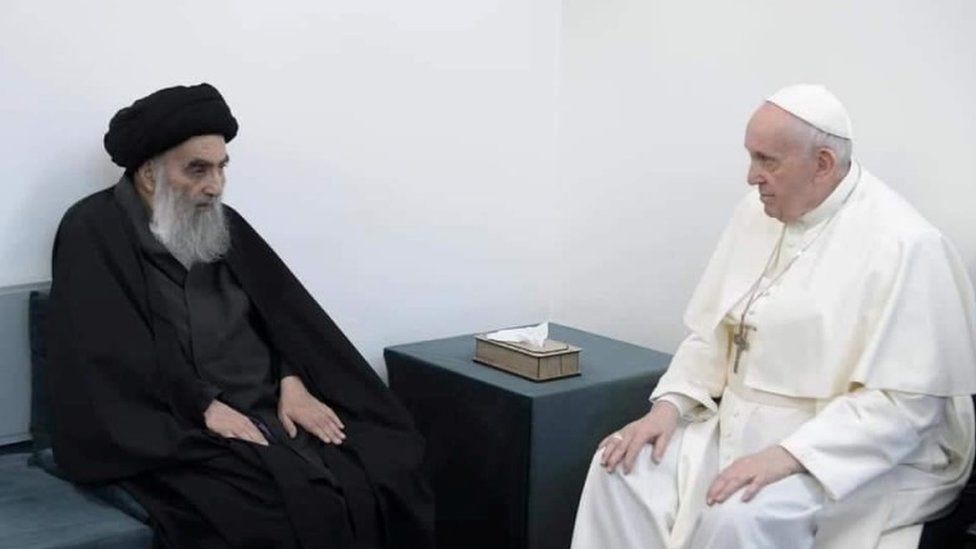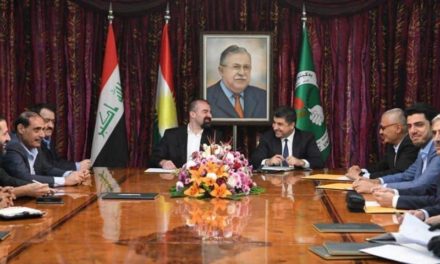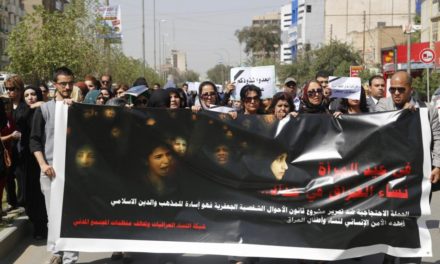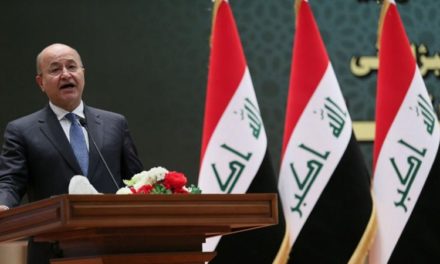(Photo: Vatican News)
On Saturday among many historic firsts throughout his trip to Iraq, Pope Francis became the first pontiff to meet with the leader of Shia Islam Grand Ayatullah Ali Al-Sistani. The Vatican had been trying to arrange the pilgrimage to Iraq for many years, since the turn of the millennium when John Paul II was refused by Saddam. Despite the challenges of the past year globally and in Iraq especially, Francis insisted his trip would go ahead and in doing so showed courage and determination driven by personal piety and a commitment to inspiring communities, Christian and non-Christian alike, that have suffered from the ravages of war. Since the appointment of Louis Sako, the leader of Chaldean Catholics in Iraq, as the second Iraqi ever to the College of Cardinals, Francis had been told of the important role the Sage of Najaf has had in promoting peace and encouraging protection of Christians. A meeting between the two leaders was an ambition of many Catholic and Shia clerics in and outside of Iraq but it would only be possible in Najaf as Sistani almost never leaves his house. When planning for this trip had begun in earnest several months ago, Francis agreed that meeting Sistani would be a key part of the trip, on the route to Ur where he would perform pilgrimage to the birthplace of Abraham.
The enthusiasm for the meeting was tempered when Najaf took its time to agree, despite prodding by the Vatican, Iraqi church leaders and the government in Baghdad. One official close to the Vatican noted that Najaf did not make it easy, insisting that the visit happen on its own terms. While this might come as a surprise, no disrespect was intended. Sistani views himself as a reluctant leader, forced to take on his role due to Iraq’s tragic circumstances, one link in a thousand year old chain of Shia Islam’s luminaries. His position is an exercise in preserving power and prestige, whether contending with dictators, viceroys or rival clerics. For Sistani, every meeting is fraught with risk to his legacy and that of Shia Islam, which is why he grants so few of them and has for years denied Iraq’s corruption-tinged politicians a chance to salvage their reputations by being pictured next to him. A papal visit therefore is not granted automatic approval, the merits and risks are weighed, and it is Sistani who grants the Pope an audience, a situation a pontiff never finds himself in when meeting anyone else. Questions on when the visit would take place, who the delegation would include, and what protocol would be followed are exchanged through intermediaries, the Iraqi government having no authority in Sistani’s affairs. In the end the details were agreed, and while the world watched on, including critics of Najaf in nearby countries, Pope Francis stepped out of his vehicle in front of the golden dome of Imam Ali’s shrine, making history with every step.
Francis is still recovering from a back injury that hinders his movement, with the effort required visible to all on his first trip since the COVID-19 pandemic. Shuffling down a narrow alleyway he would be forgiven for thinking how it is that one of the greatest Muslim leaders ever lives in such a simple place. At the door to a small house, government officials, guards and protocol officers remain outside while a privileged few accompany the Pope inside. Francis takes off his shoes and is greeted by Sistani’s son, Mohammed Ridha, who beckons him to the reception room where his father waits. Entering the room, Francis smiles warmly as Sistani welcomes him and walks slowly to the lightly upholstered sofa that has long replaced thin mattresses on the ground. Francis leans forward, studying Sistani’s face intently, aware that though he is his senior and now a frail 90 year old, Sistani still carries a sharp wit and makes every comment with care, as those who have met the Ayatullah can attest to.
Sistani speaks, through the Pope’s interpreter and assistant, in formal Arabic welcoming the Pope, appreciating the effort undertaken to visit Najaf and noting that the world faces difficult times in which religious leaders must do all they can to stop oppression, the inhibition of freedoms and forced displacement. Francis nods in agreement, thanks Sistani for his time and his efforts in promoting interfaith relations, speaking up for the persecuted in Iraq and the protection of Christians. The meeting carries on for 45 minutes, with Francis raising the issue of friction between Shia linked paramilitary groups and Assyrian communities in Ninawa and Sistani outlining the importance of Christian-Muslim relations in multi-confessional countries in supporting peace, including in Palestinian occupied territories.
The meeting concludes with Sistani wishing Catholics and all of humanity goodwill and happiness, after which the Pope, with Sistani’s permission, prays for peace in Iraq and the Middle East. Sako who is seated next to the Pope calls for photos to be taken, to which Sistani pays little attention to and as the photographers are ushered out, Francis is locked into eye contact with Sistani. Despite not saying anything, their eyes speak in a language of understanding, piety and the burden of leadership. Francis avoids grandeur and excess, the meeting with an ascetic cleric is very comfortable for him, with the exchange of grand gifts ruled out in advance and privacy given for a serious discussion. As Sistani stands to see his guest off, the Pope bids farewell with approval at the humble setting the meeting takes place in. The most touching moment is when the two men hold hands as Sistani wishes the Pope safe travels, a gesture to be etched in the annals of history.
As the papal visit continues onto the next leg and Iraqis watch with optimism and pride, they are reassured of the success of this part: a historic first meeting in Najaf between Grand Marja and Pope, reasserting the strong bonds between Iraq’s Christians and Shia Muslims. Without doubt there is more work to be done on the ground to build on the symbolism of that meeting and for Christians in Iraq to feel more confident of their future. For the Shia, this is a reminder of their duty of care and the need to use Sistani’s example better in leadership. In the decades to come 6 March 2021 will be looked at with much reverence but it should not gloss over the internal and external challenges the Shia community in Iraq and globally faces. For the next generation of Shia grand ayatullahs they have a role model to look to and precedents to follow, to ensure the links in the chain continue unbroken.
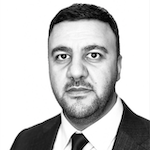
Sajad Jiyad
Sajad Jiyad is the Managing Director of Bridge, a youth development focused NGO based in Baghdad. He is a fellow at The Century Foundation and a political analyst. Sajad’s main focus is on public policy and governance in Iraq and is frequently published and cited as an expert commentator. Sajad’s educational background is in economics, politics, and Islamic studies.

